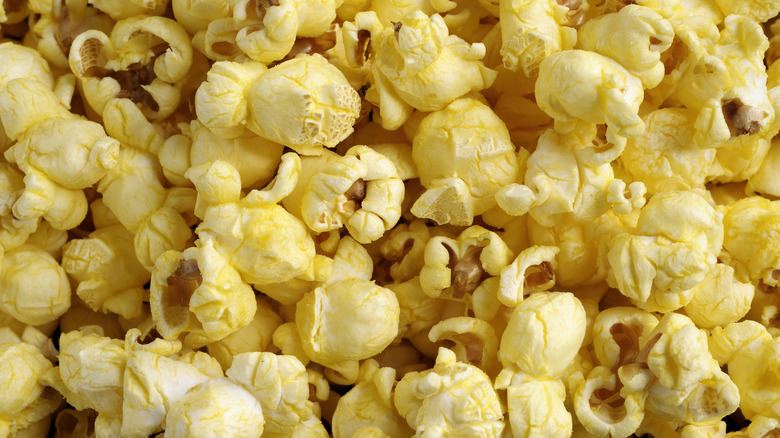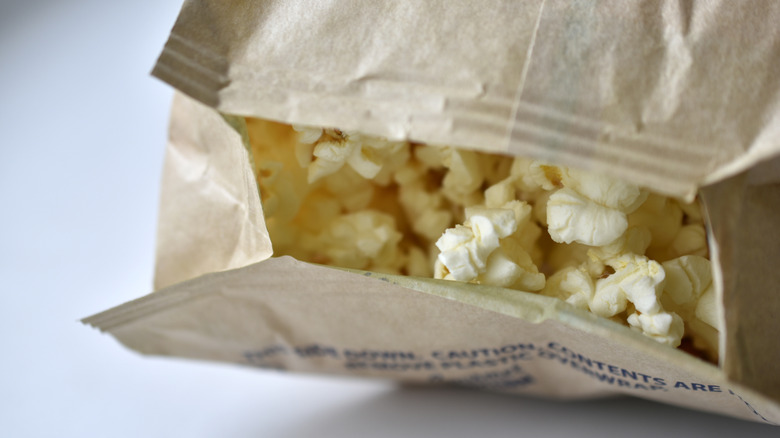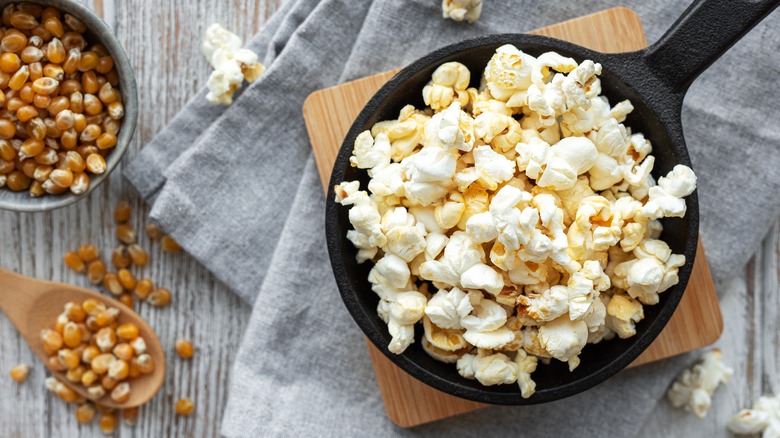Why Is Microwave Popcorn Such A Fire Hazard?
When you're in need of a salty treat to get you through your afternoon slump or late-night movie marathon, it's hard to beat the allure of microwave popcorn. Whether it's eaten doused in butter, mixed with chocolate candy, or upgraded with more unique ingredients like rosemary and citric acid, this snack's versatility makes it a staple in pantries everywhere. However, as convenient as it is, microwave popcorn can also be a significant fire hazard. So, to enjoy microwave popcorn without singeing your eyebrows, it's important to learn how to make the snack safely.
One of the main reasons microwave popcorn can be hazardous is because of its packaging. Most microwave popcorn comes in bags lined with a special coating that can stand up to the high heat of the microwave. But these bags aren't fireproof, and if left unattended, the insides can quickly get too hot and ignite. Add in the flammable oil-coated popcorn, and you're in for a night of open windows and wafting smoke away from your smoke detector. This problem can typically be avoided by keeping an eagle eye on your cooking popcorn, which is why another huge factor in popcorn fires is human error.
Keep watch as it pops
Though it may be tempting to wander off while your popcorn does its thing in the microwave, this is one of the worst things you can do as far as fire safety is concerned. It's not enough to simply follow the instructions on the packaging (which you absolutely should still do), you also need to stay in close vicinity throughout the entire popping process. By monitoring the popcorn as it finishes off the last kernels, you can act at the first whiff of smoke, stopping a fire before it happens and preventing serious damage to your kitchen.
Another crucial step in avoiding flame-broiled popcorn is to make sure you've set an appropriate cooking time for the wattage of your microwave. The higher a microwave's wattage, the faster it heats things up, so setting a high-wattage microwave to cook for a long time can result in some serious fireworks. You can find out the wattage of your microwave by looking at its manual, its serial number, or the interior of its door. Typically, popcorn packaging will include recommended cooking times for different microwave wattages. To avoid disaster, start with the lowest time suggested for your microwave and on seconds as needed.
Remember, even if you follow all the rules, microwaves can still ignite what is (don't forget) paper, oil, and the featherweight fuel of popped corn kernels. This is why you shouldn't leave them unattended — and why you should keep a fire extinguisher on hand.
Alternative popping methods
To avoid the pitfalls of microwave popcorn, you might consider using another technique to make your midnight snack. If you're willing to put a bit of elbow grease into your cooking, you can try making popcorn on the stovetop. It takes some practice, but the steps are simple: put a large saucepan with a few tablespoons of oil (or more if you like), add a cup or so of popcorn kernels, cover the pot, and shake until the kernels are done popping.
You can also use a wok to make more popcorn at once. Making this popcorn this way takes more work than a microwave, and it has the same risks as any stovetop recipe, but its sloped sides give you more control over how the popcorn pops. And since you have to give the saucepan your constant attention, it's unlikely anything bad will happen without you noticing.
Serious popcorn aficionados may even want to invest in an air-popper machine. These appliances provide the convenience of microwave popcorn packets without the danger of anything catching flame. All you have to do is pour the kernels into the machine, so this could be a great option for anyone who values a worry-free popcorn experience. Of course, there's nothing wrong with regular microwave popcorn, so long as you follow the manufacturer's instructions and monitor the cooking process.


